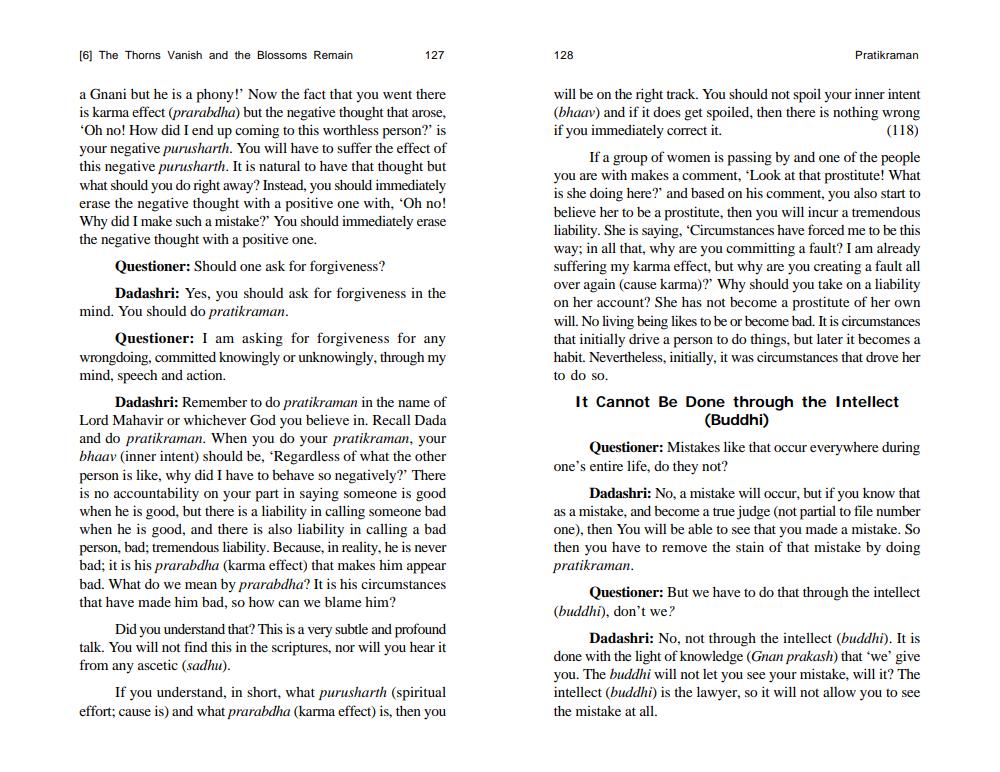________________
[6] The Thorns Vanish and the Blossoms Remain
127
128
Pratikraman
a Gnani but he is a phony!' Now the fact that you went there is karma effect (prarabdha) but the negative thought that arose, "Oh no! How did I end up coming to this worthless person?' is your negative purusharth. You will have to suffer the effect of this negative purusharth. It is natural to have that thought but what should you do right away? Instead, you should immediately erase the negative thought with a positive one with, 'Oh no! Why did I make such a mistake? You should immediately erase the negative thought with a positive one.
Questioner: Should one ask for forgiveness?
Dadashri: Yes, you should ask for forgiveness in the mind. You should do pratikraman.
Questioner: I am asking for forgiveness for any wrongdoing, committed knowingly or unknowingly, through my mind, speech and action.
Dadashri: Remember to do pratikraman in the name of Lord Mahavir or whichever God you believe in. Recall Dada and do pratikraman. When you do your prarikraman, your bhaav (inner intent) should be, 'Regardless of what the other person is like, why did I have to behave so negatively?' There is no accountability on your part in saying someone is good when he is good, but there is a liability in calling someone bad when he is good, and there is also liability in calling a bad person, bad; tremendous liability. Because, in reality, he is never bad; it is his prarabdha (karma effect) that makes him appear bad. What do we mean by prarabdha? It is his circumstances that have made him bad, so how can we blame him?
Did you understand that? This is a very subtle and profound talk. You will not find this in the scriptures, nor will you hear it from any ascetic (sadhu).
If you understand, in short, what purusharth (spiritual effort; cause is) and what prarabdha (karma effect) is, then you
will be on the right track. You should not spoil your inner intent (bhaav) and if it does get spoiled, then there is nothing wrong if you immediately correct it.
(118) If a group of women is passing by and one of the people you are with makes a comment, 'Look at that prostitute! What is she doing here?' and based on his comment, you also start to believe her to be a prostitute, then you will incur a tremendous liability. She is saying, "Circumstances have forced me to be this way; in all that, why are you committing a fault? I am already suffering my karma effect, but why are you creating a fault all over again (cause karma)?' Why should you take on a liability on her account? She has not become a prostitute of her own will. No living being likes to be or become bad. It is circumstances that initially drive a person to do things, but later it becomes a habit. Nevertheless, initially, it was circumstances that drove her to do so. It cannot Be Done through the Intellect
(Buddhi) Questioner: Mistakes like that occur everywhere during one's entire life, do they not?
Dadashri: No, a mistake will occur, but if you know that as a mistake, and become a true judge (not partial to file number one), then You will be able to see that you made a mistake. So then you have to remove the stain of that mistake by doing pratikraman.
Questioner: But we have to do that through the intellect (buddhi), don't we?
Dadashri: No, not through the intellect (buddhi). It is done with the light of knowledge (Gnan prakash) that we give you. The buddhi will not let you see your mistake, will it? The intellect (buddhi) is the lawyer, so it will not allow you to see the mistake at all.




